May 19, 2024 | 06:58 GMT +7
May 19, 2024 | 06:58 GMT +7
Hotline: 0913.378.918
May 19, 2024 | 06:58 GMT +7
Hotline: 0913.378.918
Recently, Phuc Thinh Import and Export Joint Stock Company (PTEXIM) had held the seminar on "Sustainable pepper development program and Training on agricultural technicalpractices on pepper trees" under the Rainforest Alliance project.
The Rainforest Alliance (RFA) is known as a non-governmental organization that conserves biodiversity and ensures sustainable livelihoods by changing farming practices, business and consumer behaviors.
After 33 years of development, RFA’s headquarter is in New York city with a global office system. RFA certification is confirmed in more than 70 countries. RFA certified products have been recognized by 170 countries, including difficult markets such as US, Europe... Up to now, there are about 2 million farmers with 5 million hectares of land participated in the program. They were certified with the prestigious international certification for environment of sustainable forestry, agriculture and tourism.
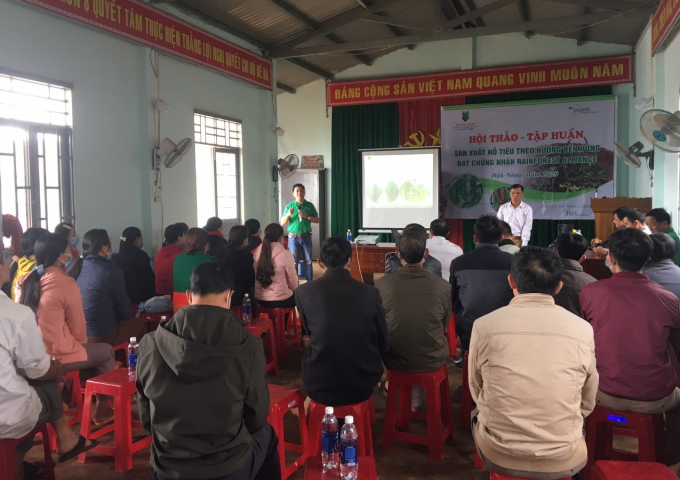
RFA - the prestigious international certification for farmers’s sustainable development
To get RFA, it is necessary to meet 5 principles of an effective planning and management system; biodiversity conservation; natural resources conservation, improving human well-being; livestock production (scope of cattle certification) and 119 strict criterias for crop and farm nutrition management...
There are 3 levels of classification A, B, C depending on the rate % compliance minimum. This assessment is conducted periodically every year. Sustainable raw material areas, stabilizing livelihoods of farmers.
With the desire to develop a sustainable raw material area, raise the quality value of Vietnamese Nam pepper on the international market, increase income for farmers who have a long-term attachment to pepper, with the permission of the Department of Agriculture and Rural Development of Dak Nong Province, Phuc Thinh Import and Export Joint Stock Company (PTEXIM) organized the seminar on "Sustainable pepper development program and Training on agricultural technical practices on pepper trees” for 100 farmer households in DakR'lap district (Dak Song, Dak Nong province). The program aims to deploy on an area of 150 hectares with an expected output of 500 tons and achieve RFA prestigious certification.
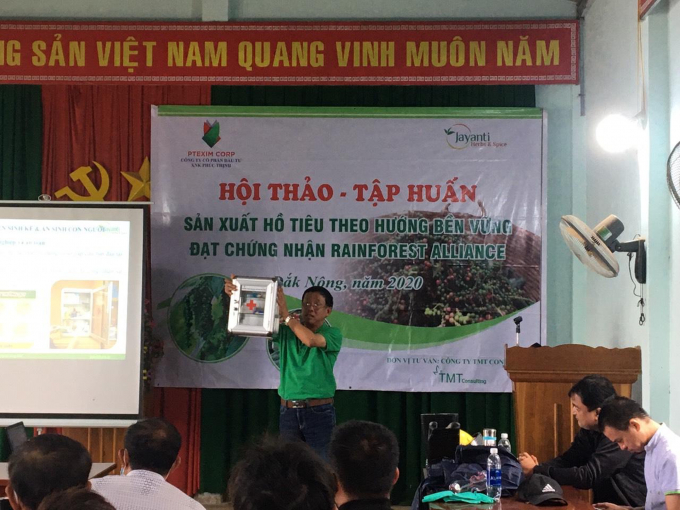
The seminar provides important experiences for farmers growing pepper to comply with RFA regulations.
From the middle of 2020, PTEXIM has officially launched the RFA project. According to it, PTEXIM organized many practical activities such as training and technical instructions that farmers can comply with RFA's regulations; technicians come to each farmer’s house to survey, give specific advices; invite RFA for evaluation and certification scheduled in April 2021.
It can be seen that, in addition to ensuring the traceability of pepper origin, bringing the value of Vietnamese pepper to international standards, increasing income for farmers, PTEXIM's RFA program is also an expression of corporate social responsibility (CSR) of businesses for the community, overcoming problems of soil and air pollution, improving the health and quality of life of farmers; contribute to environmental protection, social security, and ensure food safety for consumers.
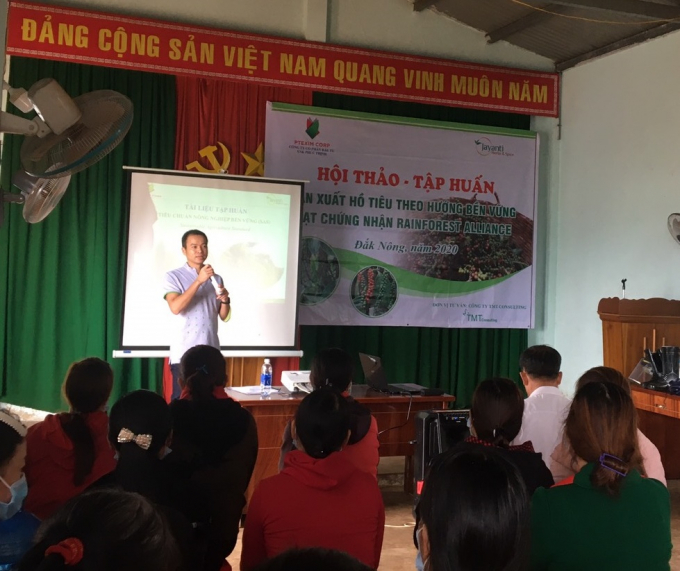
This is PTEXIM's efforts to promote Corporate social responsibility (CSR).
This is known that RFA is one of the programs under the sustainable development strategy, constantly creating different values for farmers - consumers - businesses and the domestic economy of PTEXIM.
/2024/05/17/5720-1-134847_782.jpg)
(VAN) EcoTraceTech - System for measuring CO2 and CH4 emissions from rice plants is the startup idea of a group of Can Tho University students.
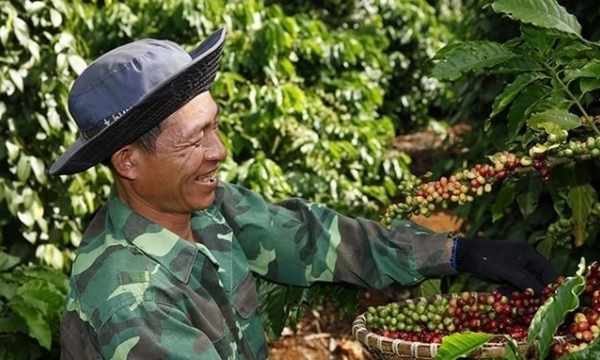
(VAN) The NESCAFÉ Plan by Nestlé Vietnam in the Central Highlands together with MARD aims to support coffee farmers in regenerative agriculture.
/2024/05/16/4437-1-223910_491.jpg)
(VAN) The Community Food Garden model is one of the outstanding activities and models of green transformation in the world as well as in Vietnam.
/2024/05/16/2455-1-111202_165.jpg)
(VAN) Artemia eggs originating in Vinh Chau (Bac Lieu) are assessed by customers to have the best quality in the world; however, domestic production output only accounts for 1%.
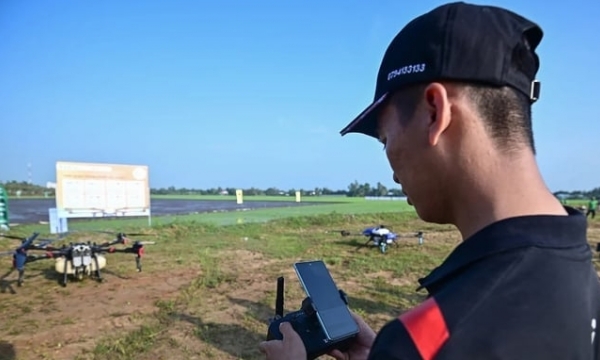
(VAN) Deputy Permanent Chairman of the National Committee for Digital Transformation Tran Luu Quang chaired the symposium on 'Promoting digital transformation of agriculture,' held on May 14.
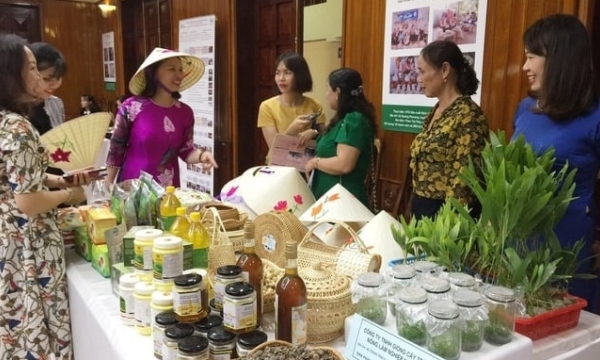
(VAN) After seven years of implementation, the Commercial Smallholder Support Project (CSSP) successfully aided numerous local households in escaping poverty, with multiple infrastructure projects initiated across Bac Kan province.
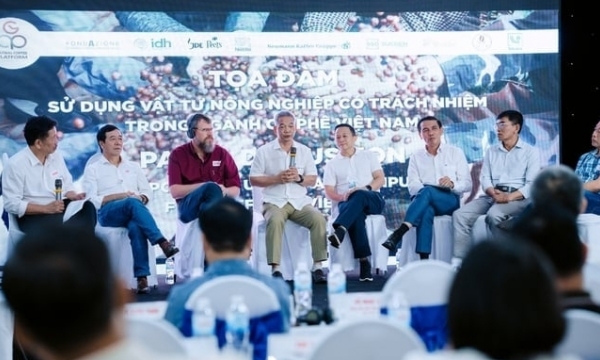
(VAN) The Global Coffee Platform (GCP) recently hosted a multi-stakeholder panel discussion on responsible use of agro-inputs in coffee production in Vietnam